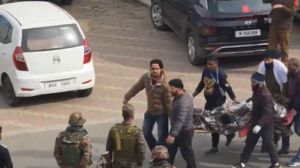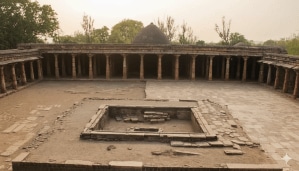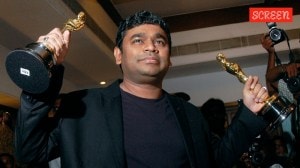The masses will decide
A French journalist reminds us of our cultural and civilisational norms. One is amused but not offended. As if this was not enough, he exh...

A French journalist reminds us of our cultural and civilisational norms. One is amused but not offended. As if this was not enough, he exhorts us how to read and interpret our own history. The eminent historian, D.D. Kosambi, must be turning in his grave. He was one of those who believed that historians should be given power by attaching more credibility to scientifically-founded knowledge of the past rather than the claim of amateurs.
Now, a leading Indian columnist admonishes India8217;s 110 million Muslims not to retreat into fundamental ghettos sustained by foreign funding.8217; Assuming that the criterion for nationhood is determined by one8217;s loyalty to the BJP, he expects them to forge an expedient working relationship8217; with that party. Without referring to the historical roots of their estrangement, he warns them of the grim consequences of a contrived alienation.8217; Besides the Muslims, this stern warning must alert millions of others who may have decided not to vote for the BJP in the forthcoming Assembly elections. I fear the next step would be putting the Christians on the firing line.
In his customary acerbic tone, the columnist proceeds to target the mullahs as well as the modernists8217; 8212; people like you and me who pursue our vocation in life unobtrusively, raise our voice against intolerance and religio-political bigotry and nurture the vision of a strong and united India. Why? The answer is that you and I share a deep-rooted8230; aversion to the BJP8217;, and that we do not recognise its leaders as the new avatars guiding our nation. The vehemence of his vituperation reaches its crescendo when the Bakhts and Naqvis are compared with Maulana Azad, Khan Abdul Ghaffar Khan and Rafi Ahmad Kidwai. This is, to say the least, adding insult to injury.
That is not all. The columnist is indignant because the certified engineers of secularism8217; and secular fundamentalists8217; have dismissed as a sham Bangaru Laxman8217;s overtures. Although cynicism and bitterness is so palpably reflected in the usage of such expressions, the noteworthy point that is conveniently overlooked is that Bangaru Laxman has, after all, struck a favourable chord among some Muslim spokesmen. If others have not joined the bandwagon, it is because their local and regional interests, coupled with their ideology, are not served by tying up with the BJP. Neither the first nor the second sets of people act as Muslims per se. Sure enough, the self-appointed Muslim leaders not the Bakhts or the Naqvis will decide whether Laxman8217;s gesture merits a degree of reciprocity or not, though the decision will ultimately rest with the Muslim peasant in Barabanki, the coal mine worker in Dhanbad, and the fishermen in coastal Andhra.
For the moment, though, the BJP president will have to come to terms with the widespread aversion to his party 8212; an aversion, I hasten to add, shared by many castes, communities and political groupings. If he has a special fondness for the Muslims and desires their expedient relationship8217; with his party, he will have to devise ways and means of redressing their grievances. If he wants them to soften their opposition, he will have to airlift the Hindutva ideologues to the Staten Island for rest and recuperation. In short, he will have to accept the primacy of the Constitution as the reference point for nurturing a national perspective.
This brings me to the Congress-led Muslim mass contact8217; campaign of 1937. Flaunting my knowledge of history is not my style, and yet one has to refute ill-informed views and interpretations. First of all, Jawaharlal Nehru, the architect of the idea, was impressed by the favourable Muslim responses to the 1937 election campaign. The ensuing drive reflected a change from the corporate conception and strategy of direct appeals to Muslims to a policy of more self-conscious, secular appeals, and direct strategy of developing support. Contrary to what this columnist thinks, the strategy paid off for the time being. By mid-1938, a hundred thousand Muslims were enrolled as primary members of the Congress outside Uttar Pradesh, Bengal, and the NWFP. Of these, 25,000 were from Bihar, 15,000 from Madras, and 13,995 from Punjab.
The campaign petered out not because of countrywide Muslim opposition, but because it was devoid of any social and economic content, and that it offered too little, too late. The secularist, radical rhetoric alarmed vested interests. The Muslim Leaguers perceived a threat to their very existence and felt that, unless they woo the poor Muslims in urban and rural areas, they might find the Congress walking away with their flock. Although the Congress and the League had existed as separate organisations, never before was there such a rivalry between them for association with the Muslim masses. Second, the Congress effort was in large part confined to urban areas with little activity expended in the villages or among the underprivileged groups, thus averting Nehru8217;s interest in disassociating Muslim peasants from Muslim landlords. Nisar Ahmad, an advocate from Bahawalpur, complained that the Congress had not reached the Muslim masses 8212; the backbone of the community8217;. The pattern of mobilisation was thus similarto that of 1930 to 1932, when Congress leaders minimised civil disobedience propaganda in areas with high proportion of Muslims in order to avoid igniting communal passions.
Finally, the strategy fell prey as well to a divided Congress and to opposition from Hindu nationalists that feared the influx of Muslim activists having a critical and unacceptable influence on party policy. People like G.B. Pant, J.B. Kripalani and Morarji Desai girded themselves to resist the campaign that threatened their political dominance and raised the chances of Nehru8217;s Muslim and communist allies dominating the Congress. Part of their strategy was to starve mass contact committees of funds, to fill them with rank communalists and to ensure that Muslims were eased out of Congress committees. Thus senior Congress office-bearers in Gorakhpur led a Holi procession with spears, swords, and sticks on display. Khushi Lal, chairman of the Dehradun municipal board, lamented that Congressmen tried imposing a social boycott of the Muslims for the sins, imaginary or real, of one or two.8217;
Important lessons must be learnt from the failure8217; of the mass contact8217;. One of them is that national unity, grounded on the principles of democracy, secularism, social justice and equity, must be the cardinal political assumption in the nation-building enterprise. The other is not to stigmatise or essentialise a community, Hindu, Muslim, Sikh or Christian, but to help build bridges of fraternity and understanding. It will be comforting if religious and political fundamentalists can be converted to this idea sooner than later.
If Laxman has a special fondness for the Muslims and desires their expedient relationship8217; with his party, he will have to redress their grievancesAtilde;tilde;
- 01
- 02
- 03
- 04
- 05































